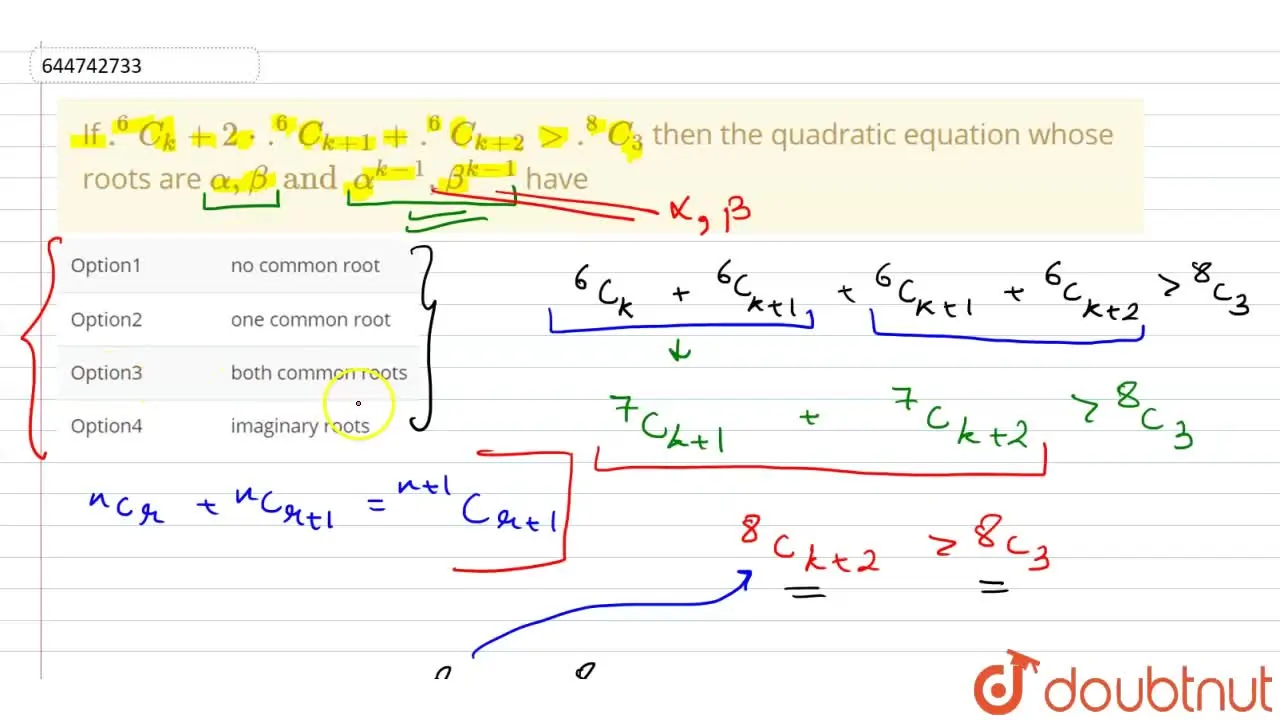If .6Ck+2⋅.6Ck+1+.6Ck+2>.8C3 then the quadratic equation whose roots are α,βandαk−1,βk−1 have
no common root
one common root
both common roots
imaginary roots
The correct Answer is:C
We have, .6Ck+2⋅.6Ck+1+.6Ck+2>.8C3
⇒ (.6Ck+.6Ck+1)+(.6Ck+1+.6Ck+2)>.8C3
⇒ .7Ck+1+.7Ck+2>.8C3
⇒ .8Ck+2>.8C3⇒k+2=4 [∵.8C4>.8C3]
⇒ k=2
∴ αk−1=αandβk−1=β
Thus, the quadratic equations having roots αandβandαk−1andβk−1 are identical.
Hence, they have both roots common.
Related Playlists
- BOOK - OBJECTIVE RD SHARMA ENGLISHCHAPTER - QUADRATIC EXPRESSIONS AND EQUATIONS EXERCISE - Section II - Assertion Reason Type22videos
QUADRATIC EXPRESSIONS AND EQUATIONS
- BOOK - OBJECTIVE RD SHARMA ENGLISHCHAPTER - QUADRATIC EXPRESSIONS AND EQUATIONS EXERCISE - Exercise138videos
QUADRATIC EXPRESSIONS AND EQUATIONS
- BOOK - OBJECTIVE RD SHARMA ENGLISHCHAPTER - QUADRATIC EXPRESSIONS AND EQUATIONS EXERCISE - Chapter Test50videos
QUADRATIC EXPRESSIONS AND EQUATIONS
- BOOK - OBJECTIVE RD SHARMA ENGLISHCHAPTER - PROBABILITY EXERCISE - Chapter Test45videos
PROBABILITY
- BOOK - OBJECTIVE RD SHARMA ENGLISHCHAPTER - SEQUENCES AND SERIESEXERCISE - Chapter Test59videos
SEQUENCES AND SERIES
Similar Questions
If α,β are the roots of ax2+bx+c=0, then find the quadratic equation whose roots are α+β,αβ.
View SolutionIf α,β are the roots of x2−x+1=0 then the quadratic equation whose roots are α2015,β2015 is
View SolutionIF α,β are the roots of the equation ax2+bx+c=0then the quadratic equation whose roots are α+β,αβ is
View SolutionIf α,β are the roots of the quadratic equation cx2−2bx+4a=0 then find the quadratic equation whose roots are:
(i) α2,β2, (ii) α2,β2, (iii) α+1,β+1, (iv) 1+α1−α1+β1−β, (v) αβ,βαView SolutionIf α,β are the roots of x2+3x+1=0, then the equation whose roots 2−α,2−β is
View SolutionIf α,β are roots of the equation ax2+bx+c=0 then the equation whose roots are 2α+3β and 3α+2β is
View SolutionThe roots of the equation ax2+bx+c=0 are αandβ. Form the quadratic equation whose roots are α+1βandβ+1α.
View SolutionIf α,β are the roots of the quadratic equation ax2+bx+c=0, form a quadratic equation whose roots are α2+β2andα−2+β−2.
View SolutionIf αβ the roots of the equation x2−x−1=0 , then the quadratic equation whose roots are 1+α2−α,1+β2−β
View SolutionIf αandβarethes√ofthe raticequationx^(2) + px + q = 0,thenformthe raticequationwhoses√arealpha + (1)/(beta), beta + (1)/(alpha)
View Solution


